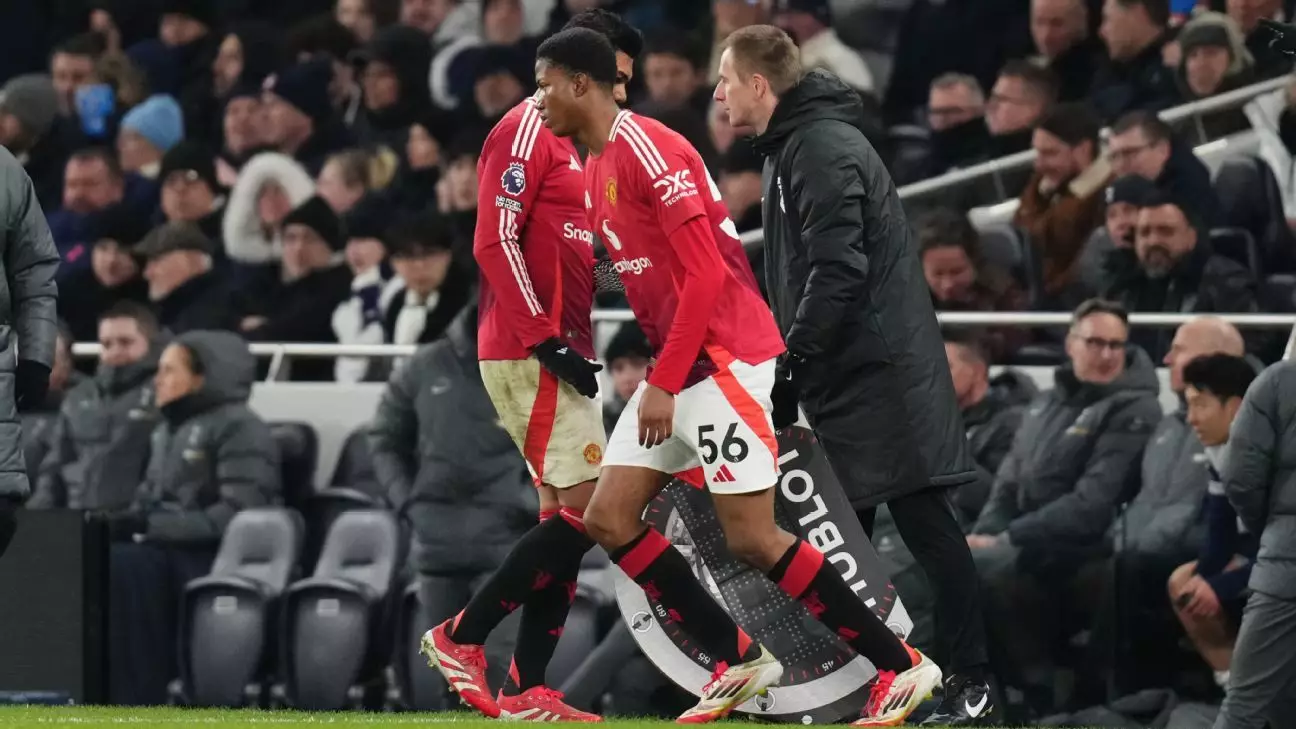Historically, Manchester United has thrived on the emergence of young talent, capturing the imagination of fans and setting benchmarks for clubs globally. Players like Federico Macheda, Danny Welbeck, and Marcus Rashford have turned pivotal moments in their careers into folklore, showcasing the club’s commitment to youth development. Each of these strikers, through their individual flashes of brilliance, contributed significantly during times when the club needed it most. Their stories have become hallmarks of success and optimism, reflecting the rich history of a club that has consistently prioritized homegrown talent.
However, as United continues to grapple with challenges both on and off the pitch, the optimism surrounding its youth setup has begun to wane. The recent loss against Tottenham Hotspur not only highlighted the struggles of the first team but also served as a poignant reminder of the precarious situation facing the club’s promising youngsters, like Chido Obi-Martin, who was introduced late in the game yet failed to make an impact.
The defeat at Tottenham was emblematic of a deeper malaise within Manchester United. With 12 players sidelined due to injuries and illnesses, including key talents such as Kobbie Mainoo and Amad Diallo, manager Ruben Amorim found himself in a dire situation. The decision to field eight teenagers on the bench—most of whom had no prior Premier League experience—underscored a troubling reality. Instead of embracing a legacy that once inspired awe, United is now compelled to depend on an untested lineup, pointing to an alarming lack of depth and preparedness in their squad.
Amorim’s late substitution of Obi-Martin appeared more desperate than strategic. Introducing a young player into an already chaotic game seemed ill-fitted. The question arises: Is this an opportunity or a potential misstep for a player who has yet to taste the rigors of top-flight football? It would be prudent to either grant young talents more meaningful minutes or shield them from high-pressure situations that could hinder their development.
The current season has placed United in an uncomfortable position, with just 12 defeats from 25 league matches, marking the club’s worst start since the 1973-74 season—a season that ended in relegation. While relegation is not an imminent threat, the alarming record raises profound concerns about the club’s trajectory and managerial strategies. Amorim’s plea to reduce focus on the “big picture” clashes starkly with the team’s 15th position in the league. It highlights an ongoing struggle where short-term fixes may not align with long-term growth.
In contrast, Tottenham’s coach, Ange Postecoglou, is grappling with his challenges but is benefiting from a different circumstance. Postecoglou’s acknowledgment of his team’s shortcomings and their persistent push for improvement demonstrates a more constructive approach than merely focusing on immediate results. His belief in momentum-building through even minor victories contributes to a healthy outlook—a stark contrast to the disillusioned state of Manchester United.
The atmosphere surrounding Old Trafford feels increasingly discordant. Protests against the ownership of the Glazer family reflect a clamoring for accountability and change, with fan discontent simmering beneath the surface. The supporters are weary of a legacy eroded by mismanagement and are yearning for a return to prominence through the reinvigoration of their beloved club.
As inconsistencies plague the pitch and frustration builds off it, the emphasis on fostering young talent must remain steadfast. The plight of Obi-Martin in the recent match is illustrative; while his potential is noteworthy, he, alongside other academy graduates, requires an environment conducive to growth—one that avoids the weight of unreasonable expectations amidst instability.
Manchester United stands at a crossroads, teetering between the hallowed legacy of its youth development and the stark challenges of the present. Amidst this turmoil, the club must reflect deeply on its strategies, player management, and the broader sense of unity needed to resurrect its fortunes.
Moving forward, nurturing young talent should not merely serve as a stopgap but as a cornerstone of a revitalized approach. This shift necessitates a blend of experienced leadership and protection for youth players to flourish without the overwhelming pressures of a disillusioned fanbase. Ultimately, the path ahead calls for introspection and a renewed commitment to restoring the ethos that once made Manchester United synonymous with greatness.
